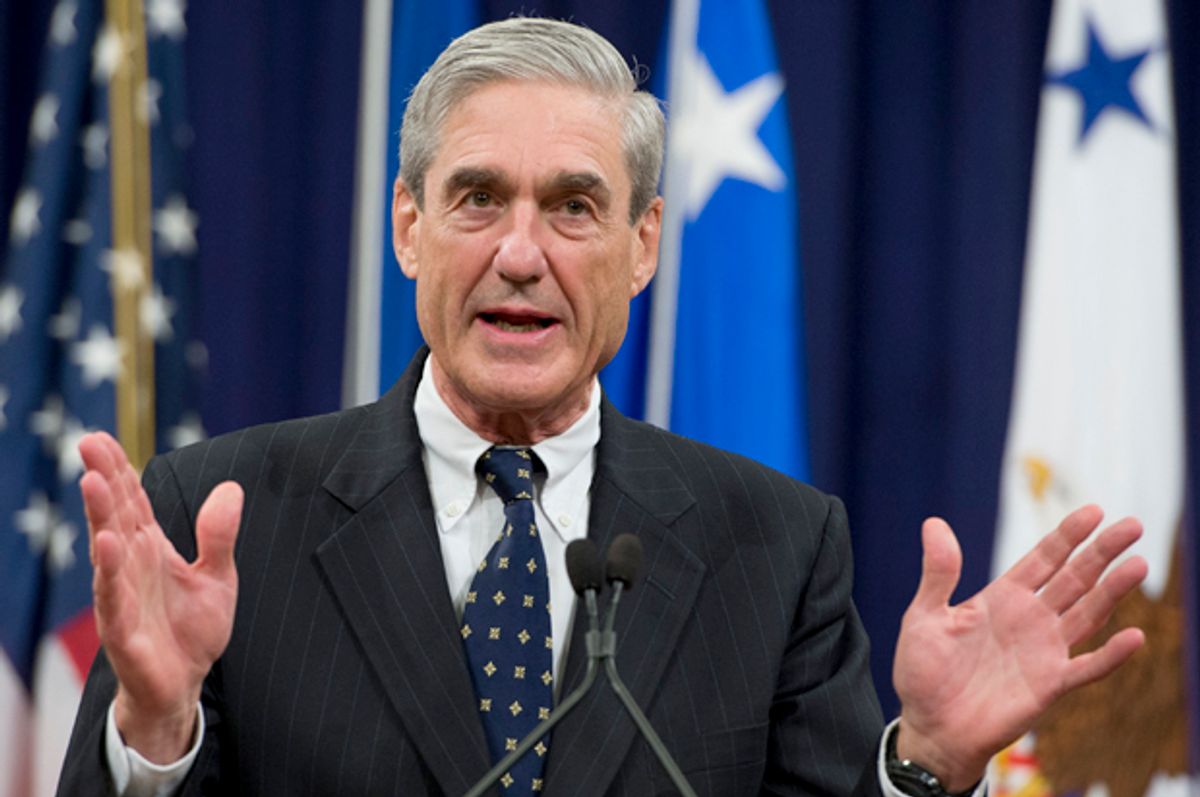If you think the firing of FBI director James Comey set off a storm of protests and nervous backtracking by anxious Republicans, wait and see what happens if Trump actually fires the special counsel now tasked with the Russia investigations, Bob Mueller.
“Some key allies of President Trump are already making the case for dismissing . . . Mueller, who is leading the investigation into possible Trump presidential campaign collusion with Russia,” writes Washington Wire. Several other news outlets on Monday night have reported similar stories.
Mueller is assembling a high-powered team of Washington legal talent, including Michael Dreeben, a former Justice Department lawyer who has argued 100 cases before the Supreme Court, and Andrew Weissmann, chief of the Justice Department’s fraud section who oversaw corruption investigations including the Volkswagen cheating probe.
Mueller was the second longest serving FBI director in history, only behind iconic and controversial director J. Edgar Hoover. His appointment was approved unanimously by the Senate, burnishing his reputation as a man above partisanship.
Confronted with Mueller’s first moves, the White House responded with the sheathed blade of an implied threat, amounting to Mueller can hire who he wants; he could be fired at any time.
Mueller’s firing would not only short-circuit the FBI investigation of the Trump entourage, it would hobble any effort to impeach the president. President Clinton's impeachment for lying about an affair with an intern, and President Nixon's for a host of abuses of power were driven in part by special prosecutor investigations.
"Unitary executive"
The first shot was fired by Jay Sekulow, a hard-right conservative activist and a member of Trump's legal team who told ABC's "This Week” that he would not rule out the firing of Mueller.
"Look, the president of the United States, as we all know, is a unitary executive," Sekulow said. "But the president is going to seek the advice of his counsel and inside the government as well as outside. And I'm not going to speculate on what he will or will not do."
The tip-off here is the phrase “unitary executive,” a legal doctrine that asserts the president has virtually unlimited powers in national security matters. Developed most aggressively by Vice President Dick Cheney and his legal advisers during the presidency of George Bush, the theory of the unitary executive was cited by White House Counsel John Yoo to justify the use of torture.
Sekulow’s comments signal that the Trump White House intends to use the unitary executive argument for a different mission: to justify the firing of Mueller on grounds of national security. In Sekulow’s view, Trump is the democratically elected leader with unlimited powers to repel threats to the United States, including the so-called “deep state” that is allegedly seeking to depose him. As a defender of Trump’s travel ban, an advocate of empaneling a grand jury to investigate Susan Rice, and a believer in the convoluted theory that President Obama orchestrated a “soft coup” to thwart Trump, Sekulow seems to be paving the way for Trump’s next line of defense: that Mueller's Russia investigation threatens American democracy.
Tweets in the wind
Then came tweets on Sunday and Monday from two Trump spokesmen with big social media followings, buttressing Sekulow's message.
If Sekulow provided the legal framework for firing Mueller, Ann Coulter and Newt Gingrich supplied the political messaging: Trump has been exonerated and Mueller is biased.
Now that we FINALLY got Comey to admit Trump not under investigation, Sessions should fire Mueller. Why do we need a special counsel now?
— Ann Coulter (@AnnCoulter) June 11, 2017
Republicans are delusional if they think the special counsel is going to be fair. Look who he is hiring.check fec reports. Time to rethink. — Newt Gingrich (@newtgingrich) June 12, 2017
Factually and logically, all of these arguments are more than dubious. There is nothing written about the "unitary executive" in the U.S. Constitution. The phrase never occured in the debates about the Constitution. The Founding Fathers did not want any branch of government to have unchecked power. The Obama Justice Department rejected the unitary executive argument in banning torture, and the Trump Justice Department has not sought to revive it, at least in the case of extreme interrogation techniques.
It is true that Trump is not the target of investigation — not now. But the investigation is not over. In his testimony to the Senate last week, James Comey made clear why he didn’t want to accede to Trump’s request to publicize that fact: because there was a less than zero chance that the president might become a target in the future — and then the FBI would have to make the fact public.
But Gingrich has a point. To understand Trump’s next move, look at who Mueller is hiring. The composition of his investigative team suggests the special prosecutor is looking to build a fraud and corruption case. That is why Gingrich claims Mueller is treating Trump unfairly, and how Trump may justify firing him.
“I can’t imagine that that issue is going to arise,” Sekulow told ABC, “but that again is an issue that the president with his advisers would discuss if there was a basis.”
Wrapped in Sekulow's hypothetical answer was both a warning and a prediction. When Trump feels unfairly treated by Mueller, he will discuss firing him. The day is not far off.




Shares